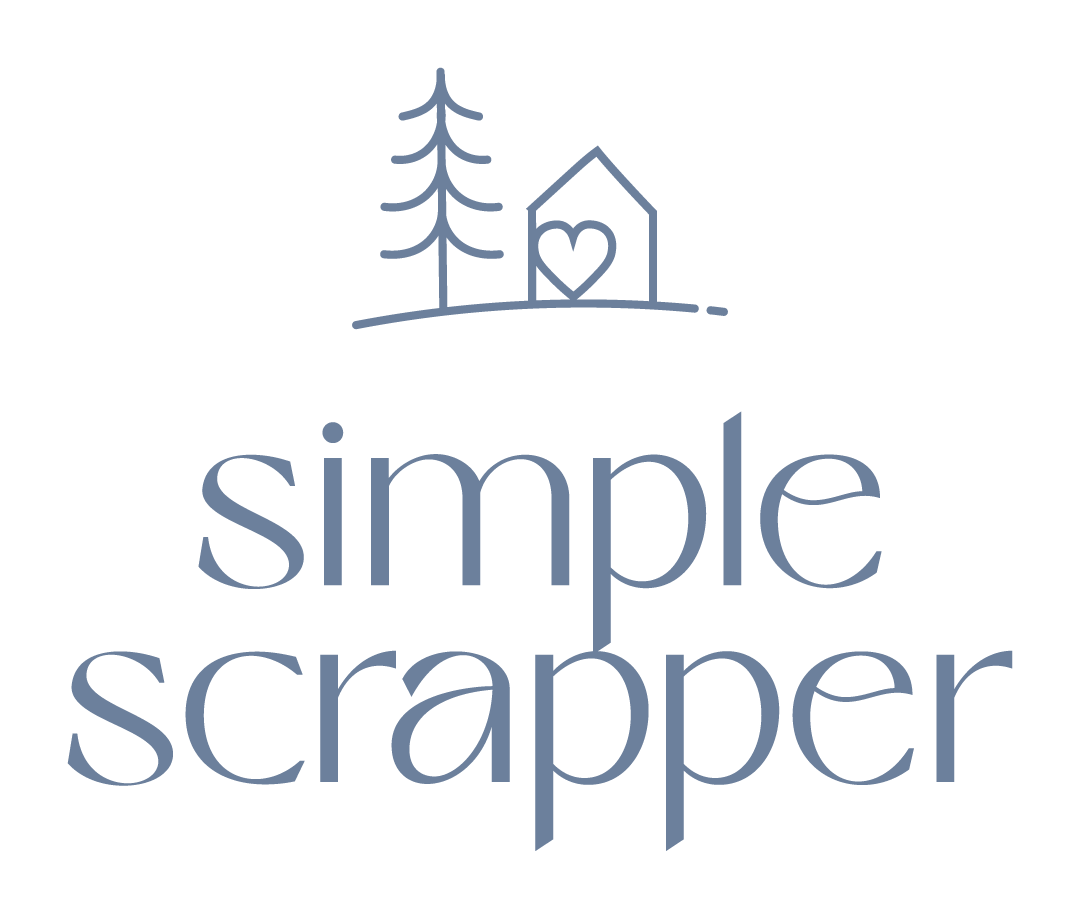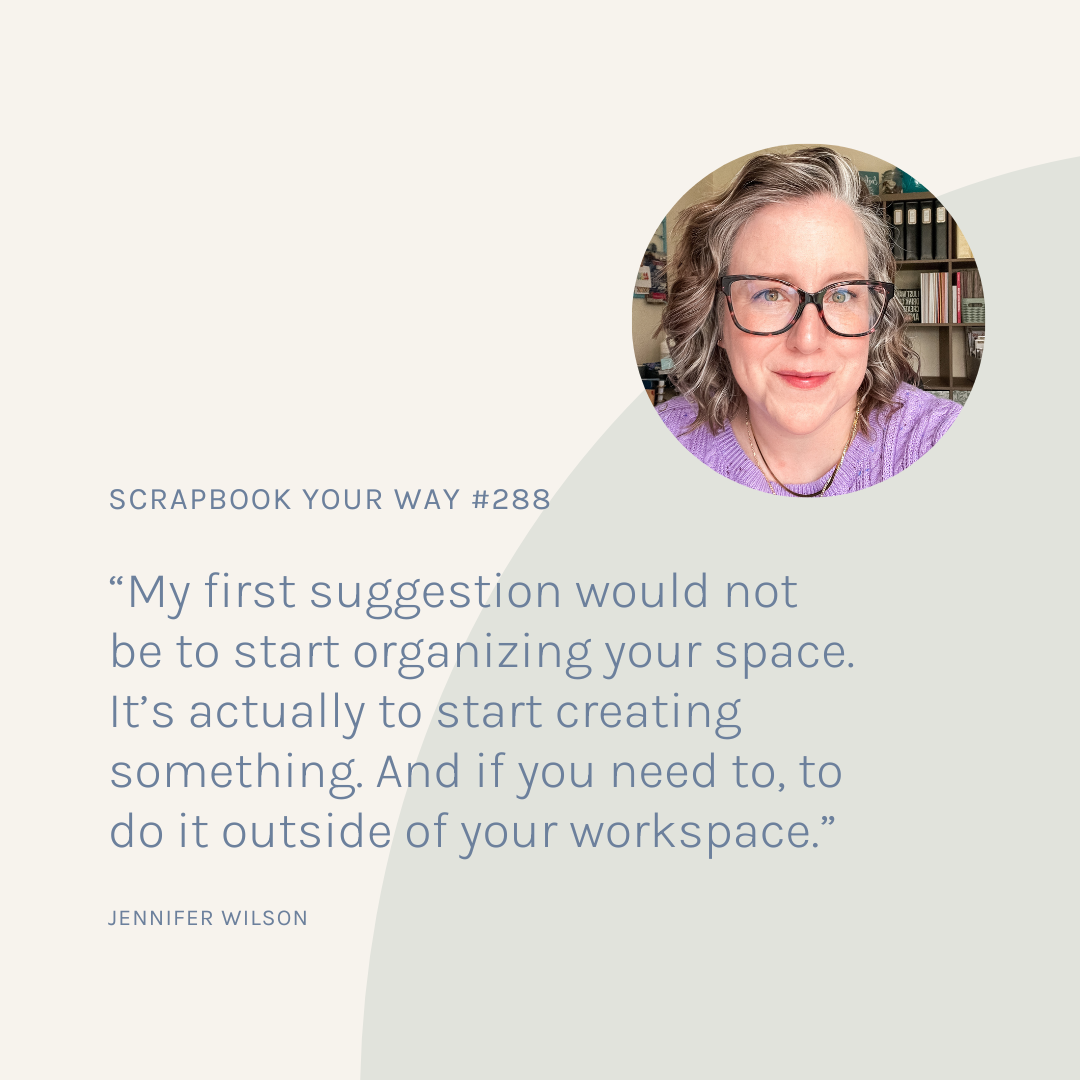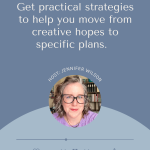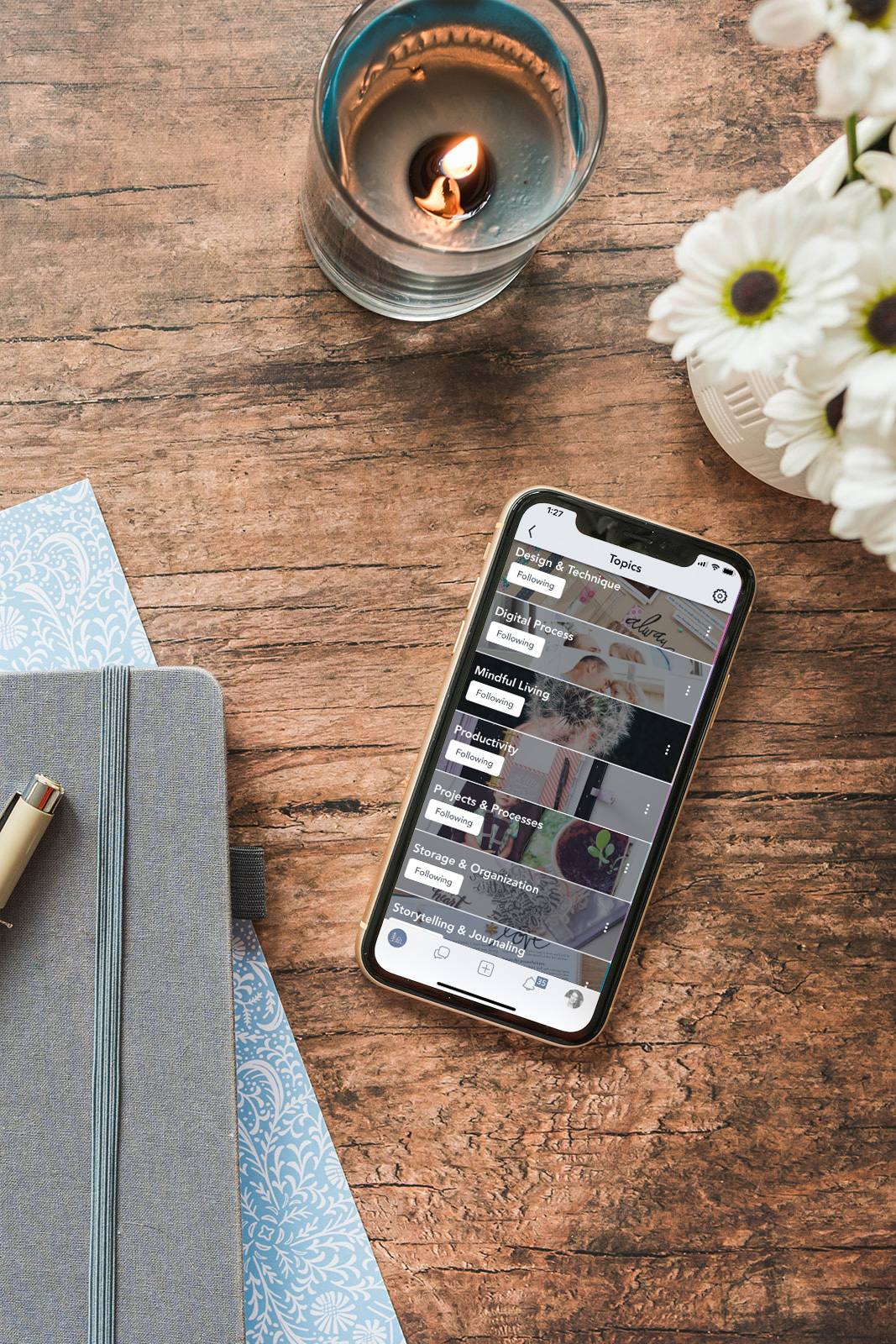Make your creative hopes a reality as you prepare for 2025 with this final episode of 2024. I’m sharing ideas for transforming scrapbooking aspirations into concrete plans, addressing common challenges scrapbookers face. From establishing regular workflows to tackling photo management and workspace organization, this short and sweet episode is packed with tips to help you find more satisfaction in your scrapbooking journey.
Timestamps
- 00:00 – Introduction to Scrapbook Your Way
- 00:32 – Reflecting on the Year and Future Plans
- 01:34 – Turning Hopes into Action Plans
- 03:13 – Example 1: Establishing a Scrapbooking Habit
- 05:35 – Example 2: Creating a Photo Management System
- 07:27 – Example 3: Reorganizing Your Workspace
- 09:44 – Example 4: Overcoming Creative Paralysis
- 12:41 – Example 5: Completing Past Albums
- 14:54 – Community Tips and Final Thoughts
Links Mentioned
*Affiliate links help to support the work we do, at no additional cost to you.
[00:00:24] Jennifer Wilson: I've talked to a number of people during the party who are kind of coming back to scrapbooking.
[00:00:29] They have this, deep craving to come back. And I know for sure that we can help you because we've helped so many like you in the past.
[00:00:38] Welcome to Scrapbook Your Way, the show that explores the breadth of ways to be a memory keeper today. I'm your host, Jennifer Wilson, owner of Simple Scrapper and author of The New Rules of Scrapbooking. This is episode 288. In this final episode of the year, I'm sharing a selection of practical strategies you might not have considered to help you move from creative hopes to specific plans.
[00:01:06] Hello, friends. I hope these last few weeks of 2024 have brought you some restorative calm and connection. I've taken a little time off after the conclusion of the planning party to regroup and finish up our preparations for 2025. I wanted to create this episode to share an excerpt from one of our recent live trainings.
[00:01:30] The segment received a lot of positive feedback for being insightful and offering solutions that were different than the norm. It is my goal to help every scrapbooker find their way forward through each season of life. To know that your hopes just need a plan for them to become reality. But even more so, to know that you are not alone on this journey.
[00:01:51] Enjoy, and I'll talk to you again in the new year.
[00:01:57] All right. So I'm really excited to jump into this section. I've done this in various ways over the years, but I love taking the things that you guys specifically say. That you want to do, accomplish, the challenges you have. And try to start formulating an action plan on those. So when I sent out the email your confirmation email for signing up for the planning party I asked if you want to reply you can share with me what are your hopes for scrapbooking in 2025.
[00:02:27] And so I picked five of those as examples. To share five different things that people really want to do that they're kind of, they're really thinking about that's on their mind and their heart. And I'll be sharing kind of some of the thoughts, next steps, and you know, how you turn that hope into a plan.
[00:02:46] We keep going back to this idea of being satisfied. And if we're not feeling satisfied, Then why are we doing it? We love this hobby. We love scrapbooking. We love how it's so uniquely personal. And the ability to combine that depth and meaning with our creativity. But ultimately, there's always places that we can improve and make our experience even better. Or sometimes we need to make it significantly better so that we can jump back in. Maybe there's something going on, something's not working anymore, so that's why we need to be asking these questions. So that we can feel satisfied again. All right. So I have five different examples here. They're all kind of different. So let's jump in. I did anonymize the submissions. But I know some of you will recognize, uh, these examples here. So, uh, one participant has a hope of getting into a regular scrapbooking habit.
[00:03:43] And so the context that she provided was that she works outside the home. She has a regular nine to five job. She's also an empty nester, but has a big family and, you know, lots of things going on. Um, but she does have quarterly in person crops scheduled with some friends and she's been doing this for a long time it sounds.
[00:04:00] So how I would turn that hope into a plan is 100 percent start with celebrating what you're already doing. You already are doing those crops. So what can you do to say, that is a great starting point, even if that's the only thing you do all year, for you know, I'm assuming these are at least day long, if not weekend crops. You can get a lot done in that time.
[00:04:23] So, I would love to see you start planning ahead for those in person crops in a realistic way. You know, I don't know how, like, totally chatty and fun you are versus productivity. There's always a balance there when we're in person. But if you plan ahead and around those, knowing what you best work on in that environment, that will help you make decisions about what to do the rest of the year when you're at home.
[00:04:49] I also would encourage this person to look for an evening time, probably not on the weekend, that will typically work. So, with the larger family, and it sounds like maybe they're local. There may be weekend things that, uh, require your time, energy, and motivation. Uh, so I'm thinking there might be an evening time where maybe your husband has something else planned or you guys like to maybe sit together in the living room and do your own things.
[00:05:20] I know my husband likes to play Rocket League on the Xbox while I'm doing something in the living room. So is there an evening time that you can typically set aside that generally works? And then finally, I want to encourage you to think about, could photo management be part of either a new morning routine or an adjustment to your existing morning routine?
[00:05:44] Because I think if photo management kind of becomes part of your near daily life, if not daily life, that will further facilitate you getting into the habit. All right, that's example number one. So example number two is their hope is to have a photo management system that allows her to stay connected to her hobby.
[00:06:08] So she knows that that's the priority and that's what she really wants to bring to the surface. And she also offered that she's also trying to streamline her creative approach to scrapbooking as well. So my plan for this individual would be to start by identifying what isn't working with your current photo management system. So what is it do you think maybe that is contributing to you not feeling connected to your hobby? Are you sure that it's your photo management system. Is it other behaviors or actions? And if it is, what is it that it's not working? It could be that you don't have a system and that's fine. But to really think about why are you targeting the system and is that the right lever to pull?
[00:06:52] And then if you are updating your photo management system, uh, I would encourage you to use new photos only. And even like when I'm doing this, I will just take random photos when I'm trying to experiment with a new app, new software, a new way of photo management. I would try at least two different things before you commit to something. Before you, you know, purchase an annual plan or more storage or whatever it is you need to do.
[00:07:17] And then I want you to, from beginning, think about how this system is going to help you scrapbook. Help you get memories documented in whatever way that looks for you. Versus how it helps you organize, edit, store, share those photos. Those may be priorities as well, but if you want your photo management system to help you stay connected to your hobby, you need to make sure it's helping you scrapbook. There are my suggestions there.
[00:07:49] Next example. So this person's hope was to reorganize her workspace and she said that she had not scrapbooked in a couple of years. And I've,
[00:07:58] I've talked to a number of people during the party who are kind of coming back to scrapbooking.
[00:08:03] They have this, deep craving to come back. And I know for sure that we can help you because we've helped so many like you in the past.
[00:08:12] So my first suggestion would be to actually not start with organizing your space. And that's actually to start creating something. And if you need to, to do it outside of your workspace.
[00:08:24] Or on even an alternate surface, like sometimes I'll set up a card table or even a TV tray table, you know. Anything that you can do to get creating without feeling like you have to be totally organized first. Because If you haven't scrapbooked in a while, you may not have the same kind of creative desires and interests that you did before.
[00:08:46] Particularly if maybe you've been watching things online, getting our emails, listening to the podcast, hanging out on Instagram and following people. So your creative interests may have evolved quite a bit since you last scrapbooked. So I would love for you to take note of what is exciting you and interesting to you in the moment.
[00:09:05] Start creating in that direction before you organize. And then finally, if you haven't thought about this already to better understand your personality and how that relates to storage needs. And I love, um, Cas Aarssen's Clutterbug system. She's got four different categories that help you understand, like, whether or not you need things grouped in large categories or smaller categories and whether or not you need hidden storage or open storage that you can see.
[00:09:36] And so she's got a really awesome matrix that helps you distinguish what you need. And I think this is so important. If you're going to reorganize your space to make sure that you're planning with that in mind. So that your space doesn't create a new barrier for yourself by, say, doing all closed storage, uh, and it turns out that's not what you prefer. Because if it's in closed storage you forget that it exists. So, definitely something to think about before you start taking steps towards that reorganization.
[00:10:06] Two more here. So this individual is in a constant state of creative paralysis. I totally understand that. I've been there myself. She said she feels all over the place and deals with perfectionism. So my suggestions here are several, and these are things that I often have to do myself because this is something that I struggle with.
[00:10:29] So I would encourage you to give yourself only A and B choices, such as, this is the layout I'm working on or the story that I want to tell. Or the kit that I'm working with or the project that I'm working on. And then your B choice is like photo management or art journaling or something that's very different.
[00:10:53] And if you can only give yourself A or B, it's basically, am I in the mood for, you know, apples or oranges? And that will reduce that decision fatigue between, okay, I don't, if, let's just say you know your priority, if you give yourself A plus B through Z, then every time you don't want to do A, you have to then pick from B through Z.
[00:11:18] So that's why you need only A and B choices. It doesn't mean that you'll never tackle all the rest of those options. And it doesn't mean that you won't update those choices weekly, monthly, whatever makes sense for you. But if you can narrow it down to two things in just this moment. Then you will be set up for the decision points you have in the next week or month.
[00:11:40] And then when you are in that moment and you need to move forward, you've chosen A or B, I love to use a sticky note with the next three small steps. And sometimes those can be very, very tiny steps. But if you're feeling paralyzed of I don't know what the first thing to do is, then okay, literally, what would be the next thing?
[00:12:00] And if I can write down these three discreet steps and do those, and then you start a new sticky note. If you've not already using this strategy, I think you'll find that it is very helpful throughout many areas of life, if you do find yourself in that place of, um, feeling scattered and paralyzed. And then also, in terms of dealing with perfectionism, I would encourage you to consider establishing a messy creative practice. Like something that's separate from your scrapbooking. That allows you to intentionally be imperfect.
[00:12:36] It doesn't have to be anything that you ever share. But I think these types of things can help you embrace imperfection. There's lots of other ways to do that as well, but that's one that's kind of most adjacent to your hobby, but still enough to be separate. All right. Okay, last example here, and thank you to everyone who submitted.
[00:12:59] There were a lot of like repeats as well, so I tried to pick kind of what was the most mentioned. And so this individual wants to complete past albums, and she specifically mentioned that her incomplete albums are mostly lacking journaling. So I would encourage her to start with identifying the root cause of why those projects were not finished.
[00:13:23] And I want to encourage you to think only in a neutral sense to identify the facts and not to place, uh, value or moral judgments on your behaviors. Because the past is the past and all we can do is move forward. But we can't understand it and use it to make better choices in the future. And so with that, if, you know, she knows that the journaling here is probably the barrier.
[00:13:50] Are there tools or strategies that can help you get more words out.. Such as voice dictation, typing on your phone with your thumbs because we're so good with that with texting and then emailing that to yourself and then printing it out or even then transcribing it by hand. There's lots of ways that we are sharing our words, uh, with our phones, even orally, that can help us get journaling onto a page that's not the mental barrier of, okay, now I have to write. And it takes us back to, you know, the fourth grade essay anxiety. And then finally on this one, I want to encourage anyone who's struggling with this to consider expectations around what is enough journaling to you.
[00:14:36] Um, and maybe, yes, you have perhaps blank spaces in your albums and you want to fill these. But going forward, could you adjust the way you design a project to have maybe four different sections of journaling to go with 20 layouts. Or one page of journaling to go with those 20 layouts. Or, yeah, obviously it depends on the formats and the sizes, but can you adjust the way that you scrapbook, the process to better accommodate what you really feel is enough journaling.
[00:15:12] And if not, if it's exactly the way you planned it, then using these other strategies, I think, can be really helpful. Okay. Ooh, okay. Lots of good comments here. So April points out, I know people that don't like to journal because they don't like their handwriting. Yes, typing it. Doing hybrid journaling can make a huge difference in that anxiety. And if you're somebody like me who has good handwriting days, and bad handwriting days, sometimes I end up typing it because of that. So that's a wonderful, wonderful option. And today with the translucent sticker paper that can make adding journaling to a layout even more invisible, I guess, if you will, in terms of it's not necessarily just a, you know, a white block that you print it out. You print that right on your regular printer, too. Linny points out that the Day One app is great. Yes, especially for if you treat it as something where you can capture things in the moment. Things that somebody said, or just your thoughts when you're on a bus from point A to B, you know, maybe you're traveling.
[00:16:15] And then you have words to start with later. And that can even be a voice dictation as well. And right into Day One. Like, you know, today we went to the hotel buffet for breakfast and then we went to a bookstore and then we walked over a bridge. And so even if you just have some of those words, it gives you a place to begin when you're going to tell that story later.
[00:16:40] Oh, thanks, Nikki. She says, as someone who can relate to perfectionism, I gave myself permission to start with sketches and then she makes them her own. I love that.
[00:16:50] And on the note with Day One, Natalie points out, document now, make later. Yeah, that can be so helpful in terms of separating things in time. Projects like Week in the Life and December Daily or even October daily. Um, if you're doing something that involves capturing what's happening in real time, if you can capture photos, words, memorabilia, and focus on that process of capturing of collecting. Then that gives you even more kind of goodies to work with when you're doing your scrapbooking later.
[00:17:27] Donna gets over the handwriting issue by using more hidden journaling. So she feels like it doesn't necessarily take away from her artful layout. Yes. Yes, that's a great strategy as well.
[00:17:38] Oh, and April points out she's been doing voice texts on Apple Notes because she doesn't want to use another app. That is a huge thing. If you can bring in, or rather, if you could do something new and satisfy a need that you have with an existing app, that will increase the likelihood that you're actually going to create a habit out of that. Rather than downloading a new app to do something that you don't normally do, and then you forget that the app is there altogether.
[00:18:06] Ah, wonderful comments here. Thank you. Thank you, everyone.
[00:18:09]
Sign up to receive email updates
Enter your name and email address below and I'll send you periodic updates about the podcast.
How to Subscribe
The best way to listen to Scrapbook Your Way is with a podcast player on your mobile device or with iTunes on your computer. You can subscribe via Apple Podcasts, Google Podcasts, or by searching for “Scrapbook Your Way” in your favorite podcast app.




0 Comments